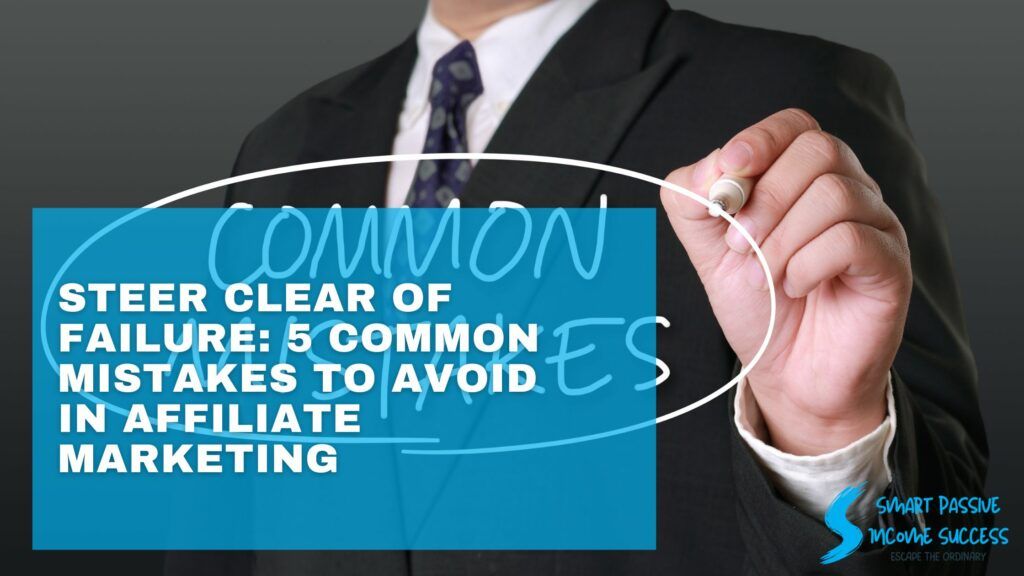Welcome back to our latest chapter in the unfolding story of mastering affiliate marketing! If you’ve been journeying with us from the start, you’ve already discovered the foundational keys to success, learned how to pick winning affiliate programs, and unlocked strategies to boost your online earnings. Each step has brought you closer to affiliate marketing prowess.
Today, we’re venturing into critical territory often overlooked: the pitfalls that can derail even the most promising affiliate marketing journey. “Steer Clear of Failure: Common Mistakes To Avoid In Affiliate Marketing” is not just another guide; it’s your shield against the common blunders that have capsized many before.
Affiliate marketing, with its vast potential for income generation, is a field where fortunes can be made and lost. The difference often lies not in the opportunities grasped but in the pitfalls avoided. Understanding these common mistakes is not just beneficial—it’s essential for anyone looking to not just survive but thrive in the competitive world of affiliate marketing.
We’ll dive deep into the quality over quantity debate, the indispensable value of truly knowing your audience, the undeniable necessity of transparency, the critical balance between SEO and user experience, and the foresight needed for long-term strategy planning. Each of these aspects plays a pivotal role in building a sustainable, profitable affiliate marketing business.
So, grab your gear as we prepare to navigate these tricky waters together. By the end of this guide, you’ll be armed with the knowledge to sidestep these common pitfalls, backed by the wisdom of those who’ve walked this path before. Let’s turn those potential missteps into milestones on your journey to affiliate marketing success.
Table of Contents
#1 Overlooking Content Quality

In the quest to fill our digital spaces with engaging material, it’s tempting to prioritise quantity—a more-is-better approach. Yet, this strategy often backfires. High volumes of content without substance can dilute your brand’s message and alienate your audience.
Prioritising Quantity Over Quality

The internet is awash with content, but not all of it is worth reading. Your audience seeks value, and information that answers their questions, solves their problems, or simply entertains them. When you focus on delivering quality over quantity, each piece of content becomes an opportunity to connect and build trust.
Lack of Authentic Product Experience and Reviews

Nothing beats the credibility of personal experience. Reviews and recommendations grounded in genuine use and understanding of a product resonate deeply with readers. They can tell when a review is authentic versus when it’s a surface-level overview, and this authenticity—or lack thereof—can significantly impact audience trust and engagement.
The Impact of Poor Content on Audience Trust and Engagement

Content is your conversation with the audience. Low-quality, uninspired content speaks volumes about your brand and commitment to your audience. On the flip side, insightful, well-researched content can turn casual visitors into loyal followers.
#2 Ignoring the Importance of Audience Understanding

Knowing who you’re talking to is as crucial as what you’re talking about. A scattergun approach to audience targeting is a recipe for missed connections and wasted effort.
Failure to Precisely Identify and Target Audience Demographics

Understanding your audience goes beyond basic demographics. It’s about diving into their interests, challenges, and behaviours. Tools and analytics can offer a glimpse into their world, helping tailor your content to meet their specific needs.
Underestimating the Value of Audience Engagement and Feedback

The conversation should never be one-sided. Engaging with your audience, soliciting their feedback, and actively participating in discussions can provide invaluable insights and foster a loyal community.
The Role of Audience Insights in Tailored Content Creation

Armed with audience insights, you can craft content that hits the mark every time. This personalised approach not only enhances relevance and engagement but also positions you as a trusted resource in your niche.
Related Post: The Ultimate Guide To Using Social Media For Affiliate Marketing
#3 Lack of Transparency in Affiliate Relationships

Transparency isn’t just a best practice; it’s a cornerstone of trust in affiliate marketing. Your audience deserves to know when they’re clicking on an affiliate link.
The Necessity for Clear Disclosure of Affiliate Links

Clear, upfront disclosure of affiliate relationships reassures your audience that you’re open and honest. This transparency is not just ethical; it’s often required by law.
Legal Repercussions of Inadequate Transparency

Failure to disclose affiliate relationships can lead to legal issues and damage your reputation. It’s a risk that’s not worth taking, especially when transparency can only enhance audience trust.
How Transparency Builds Long-term Audience Trust

When you’re open about your affiliate relationships, you’re telling your audience that you value their trust over quick gains. This long-term view builds a foundation of loyalty and respect that’s invaluable for sustained success.
The Ultimate Affiliate Marketing Guide: Sign Up Now for Exclusive Tips and Strategies!
#4 Neglecting SEO and User Experience

In the digital age, your online presence is your storefront, and both SEO and user experience (UX) are the welcoming committee that either invites visitors in or turns them away.
Common Misconceptions About SEO in Affiliate Marketing

Some affiliate marketers underestimate the power of SEO, viewing it as a complex or unnecessary addition to their strategy. However, SEO is essential for driving targeted, organic traffic to your site. Ignoring SEO means missing out on potential audiences actively searching for the products you’re promoting.
The Balance Between SEO Practices and User-Friendly Content

Striking the right balance between optimising for search engines and keeping your content engaging and user-friendly is key. Over-optimising can lead to content that feels robotic or spammy, while under-optimising may result in your valuable insights going unnoticed.
Technical SEO Aspects Often Overlooked by Affiliate Marketers

Technical SEO, such as site speed, mobile optimisation, and secure connections (HTTPS), plays a crucial role in both ranking and user experience. Affiliate marketers often overlook these aspects, focusing solely on content and links. Yet, technical SEO can significantly impact your site’s visibility and user satisfaction.
Related Post: How To Track And Analyze Affiliate Marketing Metrics
#5 Inadequate Long-Term Strategy Planning

Thriving in affiliate marketing requires more than just tactical wins; it demands a vision that sees beyond the horizon.
Short-Term Tactics Versus Sustainable Growth Strategies

Relying solely on short-term tactics, like chasing trending products without considering your brand’s fit or audience’s needs, can lead to fleeting success. Sustainable growth in affiliate marketing is built on a foundation of strategic planning, brand alignment, and audience loyalty.
The Importance of Diversifying Affiliate Products and Income

Diversification is not just a strategy for investors; it’s also crucial for affiliate marketers. Putting all your eggs in one basket is risky—if that program changes commission structures, your earnings could plummet overnight. Diversifying your affiliate offerings can provide income stability and open up new audience avenues.
Adapting to Market Changes and Evolving Affiliate Marketing Trends

The digital landscape is ever-changing, and so are the strategies that work within it. Staying informed about the latest trends in affiliate marketing and being willing to adapt your strategies accordingly is essential for long-term success. This might include exploring new social media platforms, adopting emerging technologies like AI for content creation, or leveraging data analytics for deeper audience insights.
Related Post: The Pros And Cons Of Joining Affiliate Programs
The Ultimate Affiliate Marketing Guide: Sign Up Now for Exclusive Tips and Strategies!
Frequently Asked Questions (FAQs)

Q1: How often should I update my website’s content for SEO?
A: Regular updates are crucial for keeping your content fresh and maintaining SEO rankings. Aim to update your site with new, high-quality content at least once a week, and don’t forget to revisit and refresh older content periodically to ensure it remains relevant and optimized.
Q2: Can I succeed in affiliate marketing without a website, using only social media?
A: While social media can be a powerful tool for affiliate marketing, having your own website gives you more control over your content and SEO, allowing for deeper audience engagement and trust-building. It’s possible to start on social media, but a website should be part of your long-term strategy.
Q3: How important is niche selection in avoiding common affiliate marketing mistakes?
A: Choosing the right niche is critical. A well-selected niche aligns with your interests and expertise, making it easier to create authentic, engaging content and build a dedicated audience. It helps prevent the mistake of spreading your efforts too thin across unrelated products or markets.
Q4: What’s the best way to maintain transparency in affiliate relationships?
A: The best practice is to include clear, concise disclosures near affiliate links or at the beginning of your content, informing readers of your affiliate relationships. This transparency not only builds trust but also complies with legal requirements.
Q5: How can I diversify my affiliate marketing income effectively?
A: Start by promoting a range of products within your niche that offer value to your audience. Then, consider exploring different affiliate programs and platforms. Finally, look into related niches or complementary products that could appeal to your audience, expanding your opportunities for commissions.
Q6: Is it necessary to be an expert in SEO to succeed in affiliate marketing?
A: While being an SEO expert can certainly help, it’s not strictly necessary for success. Understanding basic SEO principles and applying them consistently to your content can yield significant improvements in your site’s visibility and traffic.
Conclusion - 5 Common Mistakes To Avoid In Affiliate Marketing
Navigating the world of affiliate marketing is an ongoing journey of learning and adaptation. By steering clear of the common mistakes outlined in this guide—focusing on quality content, understanding and engaging with your audience, maintaining transparency in your affiliate relationships, balancing SEO with a great user experience, and planning with a long-term perspective—you set the stage for a rewarding and sustainable affiliate marketing career.
Remember, the ultimate key to success in affiliate marketing lies in providing genuine value to your audience, building trust through transparency and quality, and staying agile in the face of industry changes. With these principles in mind, you’re not just avoiding common pitfalls; you’re paving a path to success.
And if you’re looking for a comprehensive guide to take your affiliate marketing to the next level, don’t forget to check out our #1 Recommended Training Program. It’s designed to equip you with the tools, knowledge, and strategies needed to thrive in the competitive landscape of affiliate marketing.
We hope this series has illuminated the path for your affiliate marketing journey. What pitfalls have you encountered, and how have you overcome them? Share your experiences and insights in the comments below. Together, let’s continue to grow and succeed in the dynamic world of affiliate marketing.






